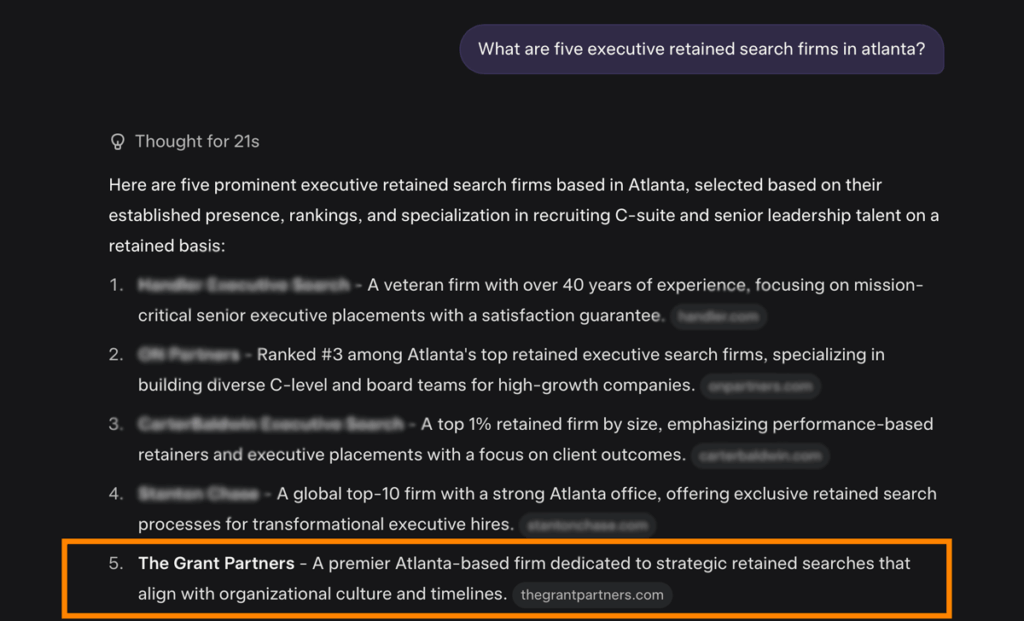“What are five executive retained search firms in Atlanta?”
This was the prompt we asked Grok (the AI chatbot created by Elon Musk’s company xAI) to see if our client, The Grant Partners, would appear in its answer.
The result? Grok listed our client in its answer.

Here’s a quick backstory.
Two months ago, The Grant Partners had a website that wasn’t bad, but it wasn’t serving them as an asset for their business. It wasn’t generating leads or quality website traffic. It wasn’t winning on the SEO front. And it especially wasn’t winning on the AI search front.
The Grant Partners hired our company to create a new website for them – from the design to the content to the development. Given our knowledge of search and AI, and the awareness of where online search may be heading, we engineered the website for traditional and AI search.
Optimization for AI Search – Why?
As I frequently talk about, AI search is a major new opportunity for businesses to succeed online. People are increasingly using AI to get the information they’re looking for.
According to a study by OneLittleWeb titled, Are AI Chatbots Replacing Search Engines?, AI chatbot usage “showed consistent and accelerating growth” from April 2024 to March 2025 and achieved “a peak of 7.0 billion visits in March 2025—a 124.46% increase over the course of the year.”
Also, online search has forever changed thanks to AI. For example, a recent study by SE Ranking found that Google AI Overviews now appear in over 30% of queries. To add, AI Overviews cite 13+ sources on average with 43% of responses linking back to Google’s organic search results.
Throughout this transformation of search, SEO (search engine optimization) remains an important marketing investment for businesses. However, the transformation has also given rise to a new opportunity for businesses: to appear in AI-generated answers. Businesses can strive to accomplish this through GEO (Generative Engine Optimization), a new variation of SEO.
What is GEO?
GEO is about optimizing content for AI search tools like Grok, ChatGPT, and AI Overviews. It’s the next version of SEO. And studies are showing it’s effective. According to a recent study by Princeton researchers, “Generative Engine Optimization methods can boost visibility by up to 40% on diverse queries.”
The tactics for optimizing content for AI search are similar to those of SEO, and great SEO plays a key role in successful GEO. However, there are some key differences.
To maximize your GEO, you want to focus on creating authoritative and high quality content, adding structured data and schema markup, writing in natural language, prioritizing user intent, and making important technical optimizations and improvements to your website. AI tools prioritize clear answers over keyword-stuffed articles.
Here’s a chart that breaks it all down:
| GEO Tactic | Why It Matters for AI Tools | How We Applied It for The Grant Partners |
|---|---|---|
| Authoritative, high-quality content | AI favors clear, cited answers over fluff | Wrote clearly and concisely, avoided redundancy |
| Structured data & schema markup | Helps AI parse and site your content | Used plugin to deploy schema for all pages |
| Natural language & user intent | Matches how people query AI | Wrote conversationally for majority of content, including blog content |
| Technical optimizations | Fast, mobile-friendly sites improve visibility chances | Prioritized load times, rendering speeds, user experience (especially mobile) |
How’s Your Business’s Online Visibility?
Are you ready to improve your business’s online visibility in AI search? Want to increase your company’s AI visibility? Let’s get in touch. Contact us today.
Thanks for Reading
Thank you for reading this content! We hope you found it valuable. Subscribe to receive the latest Demand Thrive content straight to your inbox.

